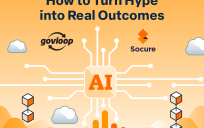In an era marked by rapid technological advancements, shifting economic policies, and evolving citizen expectations, public-sector leaders are increasingly tasked with navigating a complex and uncertain environment. To meet these challenges head on, governments must adopt futureproof governance strategies that prioritize resilience, adaptability, and innovation while maintaining robust security and privacy protocols.

Adaptive Governance Frameworks: A Foundation for Resilience
Adaptive governance frameworks enable public-sector organizations to respond effectively to changing circumstances. These frameworks are designed to be flexible, allowing leaders to adjust policies and operations based on emerging data, shifting priorities, or unforeseen challenges.
Key components of adaptive governance include:
- Decentralized Decision-Making: Empowering local leaders to make decisions based on real-time conditions fosters faster, more relevant responses.
- Scenario Planning: Governments can use predictive analytics to model potential future scenarios, enabling proactive rather than reactive decision-making.
- Cross-Sector Collaboration: Partnerships with private enterprises, academia, and civil society can introduce diverse perspectives and innovative solutions to complex problems.
By implementing these frameworks, governments can build systems capable of weathering economic shifts, technological disruptions, and societal changes while maintaining continuity in service delivery.
Integrating Innovation Culture
Fostering a culture of innovation is critical for resilience. Public-sector organizations must encourage experimentation and embrace technological advancements, such as artificial intelligence (AI) and the Internet of Things (IoT), to enhance operational efficiency and citizen services.
For example:
- AI-Powered Predictive Models: AI can forecast public needs, from traffic management to healthcare resource allocation, allowing for more efficient use of resources.
- IoT for Smart Cities: IoT devices can monitor infrastructure health, optimize energy consumption, and improve urban mobility.
Innovation must be underpinned by continuous learning and professional development to ensure public-sector employees are equipped to harness these tools effectively.
Secure Data-Sharing Practices
Data is the backbone of modern governance, but its use comes with significant security and privacy concerns. Governments must establish secure data-sharing protocols to protect sensitive information and maintain public trust.
Recommended practices include:
- Zero-Trust Architecture: A “never trust, always verify” approach ensures that all access points are continuously authenticated and monitored.
- Encryption Standards: Strong encryption protects data during storage and transmission, minimizing the risk of breaches.
- Privacy by Design: Embedding privacy considerations into the development of new technologies ensures compliance with regulations, such as the EU’s General Protection Data Regulation (GDPR), and fosters citizen confidence.
Balancing Predictive Power With Privacy
Predictive modeling can help governments anticipate and address issues before they escalate, but it must be implemented responsibly. Transparent policies, clear accountability, and regular audits are essential to ensure these tools are used ethically and without infringing on individual privacy rights.
Looking Ahead
Futureproof governance requires a mindset shift from reactive problem-solving to proactive resilience-building. By adopting adaptive frameworks, fostering innovation, and prioritizing security and privacy, governments can navigate uncertainty while enhancing public trust and operational effectiveness. Governments that embrace these strategies will also be well-equipped to face the challenges of the future and capitalize on emerging opportunities. By prioritizing resilience today, public-sector leaders can create a governance model that is both adaptable and enduring.
Dr. Rhonda Farrell is a transformation advisor with decades of experience driving impactful change and strategic growth for DoD, IC, Joint, and commercial agencies and organizations. She has a robust background in digital transformation, organizational development, and process improvement, offering a unique perspective that combines technical expertise with a deep understanding of business dynamics. As a strategy and innovation leader, she aligns with CIO, CTO, CDO, CISO, and Chief of Staff initiatives to identify strategic gaps, realign missions, and re-engineer organizations. Based in Baltimore and a proud US Marine Corps veteran, she brings a disciplined, resilient, and mission-focused approach to her work, enabling organizations to pivot and innovate successfully.




Leave a Reply
You must be logged in to post a comment.